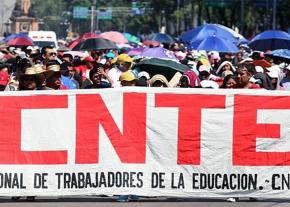We have to punch together
reports from San Diego on a solidarity tour by teachers in Mexico who are fighting against privatization and repression--and asking for support.
LEADERS FROM Mexico's dissident teachers' union visited San Diego on March 4, telling a terrifying tale of government corruption, corporate greed and police oppression--but also inspiring their audience with examples of successful acts of collective resistance, civil disobedience and community solidarity.
The Committee for Labor and Community Solidarity organized the event, which was held at the headquarters of the San Diego Education Association.
Teachers from the Coordinadora Nacional de Trabajadores de la Educación (CNTE) have been fighting against President Enrique Peña Nieto's education "reforms" for years, but recent months have seen the movement build into an avalanche. The struggle against spiking gas prices--known as "gasolinazo" protests--resulting from privatization of the oil industry has radicalized previously apathetic regions.
"Energy reform has increased prices," teacher Marcela Z. said through a translator. "What do we think education reform will do?"
Most mainstream accounts of the education reform focus on the introduction of federal teacher evaluations, which Marcela calls an attempt to "fire the teacher base and scatter the rank and file."

But the reforms being pushed also call for the privatization of basic services and would force parents to pay for required items like school supplies and uniforms, despite the Mexican Constitution's guarantee that "educational services provided by the state shall be free of any fee whatsoever."
Residents of Sonora and Baja California have already seen firsthand the dangers that privatization can bring. Despite resulting price hikes to consumers, the government is selling the desert's water to multinationals like Constellation Brands, the corporation that owns Corona, Modelo and San Diego's Ballast Point Brewing Company.
"Neoliberalism is destroying every living thing here," said Margarita Q. of Mexicali. "They are committing a disastrous theft."
Indeed, sometimes it is literal thievery. Veteran teacher Beatriz K. spoke on behalf of 3,200 Baja, California, teachers whose pensions have disappeared. They have occupied Governor Francisco Vega's office and sued him in federal court for fraud and theft.
"We're fighting for our dignity," Beatriz said. "We're not asking for charity from the governor. We're demanding what belongs to us by law."
However, at $2,550 for legal fees--an especially steep price for the secretaries and janitors who also have missing pensions--not everyone can afford to fight in the legal system.
AS THESE outrages have added up, resistance has grown. Margarita expected 400 attendees at a march she helped organize in January. Fifteen thousand showed up--and subsequent events drew 30,000, and then 80,000.
As a result, Vega rolled back part of the water privatization bill and "came down from Olympus" to meet with protesters. Marcela cited a poll showing that parents, in an overwhelming majority, support the teachers' resistance. "Parents are very much our allies," she said, despite the "dirty campaign" the corporate media has waged in the service of the government's position.
All three teachers have either experienced or witnessed vicious retaliation. Not only was Marcela fired, but the government expelled her 2-year-old daughter from day care--"the youngest to ever be expelled," she said. A successful court challenge reinstated the child, though there remain other teachers with expelled children who are unable to afford the court fees.
Margarita spoke of protesters, including older women engaged in civil disobedience, whom the police illegally arrested and treated with savage brutality.
San Diego was the only north-of-the-border stop on the teachers' speaking tour, but their concerns are global ones.
"The programs and projects that come to our country are copied" from American think tanks, Marcela said. "We are fighting against a political system that puts CEOs in charge of companies that want to profit from education and don't care about learning."
In the question-and-answer session that followed the panel discussion, many attendees bemoaned the weakness and inaction of American unions. San Diego teachers, some of whom learned this week that their jobs are in jeopardy, described their own union as "toothless."
"We're living the same situation," Marcela said. "It's obvious that these countries don't want educated people."
Panelists and attendees alike emphasized the need for solidarity against neoliberalism and the drive for privatization. "We're different, and we can be different," Margarita said. "We can think different, look different--but we have to punch the same, united."


